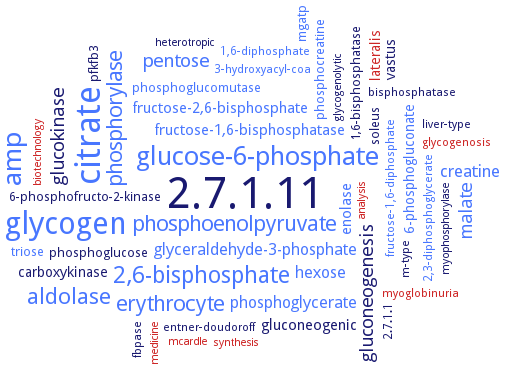2.7.1.11: 6-phosphofructokinase
This is an abbreviated version!
For detailed information about 6-phosphofructokinase, go to the full flat file.

Word Map on EC 2.7.1.11 
-
2.7.1.11
-
citrate
-
glycogen
-
amp
-
glucose-6-phosphate
-
2,6-bisphosphate
-
aldolase
-
phosphorylase
-
phosphoenolpyruvate
-
erythrocyte
-
pentose
-
glucokinase
-
gluconeogenesis
-
malate
-
creatine
-
hexose
-
glyceraldehyde-3-phosphate
-
phosphoglycerate
-
fructose-2,6-bisphosphate
-
enolase
-
fructose-1,6-bisphosphatase
-
gluconeogenic
-
vastus
-
carboxykinase
-
6-phosphogluconate
-
lateralis
-
6-phosphofructo-2-kinase
-
phosphoglucose
-
triose
-
phosphoglucomutase
-
pfkfb3
-
soleus
-
1,6-bisphosphatase
-
mgatp
-
phosphocreatine
-
fbpase
-
m-type
-
fructose-1,6-diphosphate
-
myoglobinuria
-
bisphosphatase
-
glycogenosis
-
2.7.1.1
-
1,6-diphosphate
-
liver-type
-
entner-doudoroff
-
2,3-diphosphoglycerate
-
3-hydroxyacyl-coa
-
mcardle
-
synthesis
-
heterotropic
-
biotechnology
-
analysis
-
glycogenolytic
-
myophosphorylase
-
medicine
- 2.7.1.11
- citrate
- glycogen
- amp
- glucose-6-phosphate
- 2,6-bisphosphate
- aldolase
- phosphorylase
- phosphoenolpyruvate
- erythrocyte
- pentose
- glucokinase
-
gluconeogenesis
- malate
- creatine
- hexose
- glyceraldehyde-3-phosphate
- phosphoglycerate
- fructose-2,6-bisphosphate
- enolase
- fructose-1,6-bisphosphatase
-
gluconeogenic
-
vastus
-
carboxykinase
- 6-phosphogluconate
- lateralis
- 6-phosphofructo-2-kinase
-
phosphoglucose
- triose
- phosphoglucomutase
- pfkfb3
- soleus
-
1,6-bisphosphatase
- mgatp
- phosphocreatine
- fbpase
-
m-type
- fructose-1,6-diphosphate
- myoglobinuria
-
bisphosphatase
- glycogenosis
-
2.7.1.1
- 1,6-diphosphate
-
liver-type
-
entner-doudoroff
- 2,3-diphosphoglycerate
- 3-hydroxyacyl-coa
- mcardle
- synthesis
-
heterotropic
- biotechnology
- analysis
-
glycogenolytic
- myophosphorylase
- medicine
Reaction
Synonyms
1-phosphofructokinase, 2-keto-3-deoxygluconate kinase, 6-phosphofructo 1-kinase, 6-phosphofructo-1-kinase, 6-phosphofructokinase I, 6-phosphofructokinase, platelet type, 6-phosphofructose 1-kinase, 6-phosphofructose-1-kinase, A/GTP-PFK, ADP-dependent phosphofructokinase, APE0012, At2g22480, At4g26270, At4g29220, At4g32840, At5g56630, At5g61580, ATP-dependent 6-phosphofructokinase, ATP-dependent 6-phosphofructokinase isozyme 2, ATP-dependent PFK, ATP-dependent phosphofructokinase, ATP-PFK, ATP: D-fructose-6-phosphate-1-phosphotransferase, ATP:D-fructose-6-phosphate-1-phosphotransferase, D-fructose-6-phosphate 1-phosphotransferase, fructose 6-phosphate kinase, fructose 6-phosphokinase, hosphofructokinase-1, HVO_A0328, KDG kinase, KDGal kinase, KDGK-1, KDGK-2, kinase, phosphofructo- (phosphorylating), LmPFK, muscle-type phosphofructokinase, nucleotide triphosphate-dependent phosphofructokinase, OC_Os04g39420, PFK, PFK-1, Pfk-2, PFK-L, PFK-M, PFK-P, PFK1, PFK2, PFK3, PFK4, PFK5, PFK6, PFK7, PFKA, PFKA1, PFKA2, PFKA3, pfkB, PFKL, PFKM, PFKMS, PFKP, PfpA4, phospho-1,6-fructokinase, phosphofructo-1-kinase, phosphofructokinase, phosphofructokinase 1, phosphofructokinase M, phosphofructokinase-1, phosphofructokinase-2, phosphofructokinase-M, phosphofructokinase-P, phosphohexokinase, TbPFK, TcPFK


 results (
results ( results (
results ( top
top





